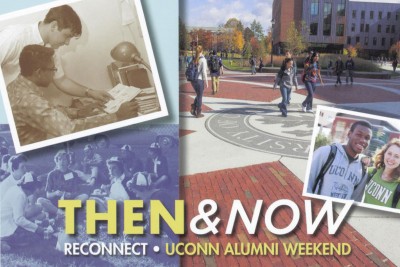 Accolades – below are news and notes from our alumni, faculty, staff, and students. We are proud of all the amazing accomplishments by our Neag family. If you have an accolade to share, we want to hear from you! Please send any news items (and story ideas) to shawn.kornegay@uconn.edu.
Accolades – below are news and notes from our alumni, faculty, staff, and students. We are proud of all the amazing accomplishments by our Neag family. If you have an accolade to share, we want to hear from you! Please send any news items (and story ideas) to shawn.kornegay@uconn.edu.
Students
Husky Sport was first runner-up for the Ignite Challenge among UConn organizations participating in the fundraising competition and received an award for $2500. A total of 394 donations helped them raise $8,484.15 to UConn. They were also recognized with the “Best Social Media Marketing” award. Thanks to everyone for their support.
Students from the Sport Management Program organized and hosted a tailgating event before the UConn football spring game for alumni and students (grad and undergrad) to mingle and network.
The Neag Graduate Student Association is pleased to announce the recipients
of the Spring 2013 Travel Awards, each receiving $140 towards their travel:
- Rachel E. K. Larson
- Jon J. Rizzo
- Yan Wei
- Amy Gaesser
- Craig Marroquin
- Janice Kooken
- Riana Pryor
- William Adams
- Lesley Willis
- Ji Yeon Jung
- Michael Mudrick
- Raymond Cotrufo
- Kelly Pagnotta
- Jessica Martinez
- J. Luke Pryor
- Douglas Jensen
- Garret Ash
Students from the Renzulli Academy earned some outstanding honors:
Hartford’s Creative Youth Essay Award Contestants & Teachers
Grades 7th & 8th
- 1st Place Kay Clark (Teacher, Ms. Albro)
- 2nd Place Chadd James (Teacher, Ms. Albro)
- 3rd Place Larry Starks (Teacher, Ms. Lyons)
Grades 9th & 10th
- 1st Place Shaila Murdock (Teacher, Ms. Plaganis)
National History Day State Competition — Natiel, Xaniyah, Dezia & Tiara took 1st place in the Junior Division for their Group Website on the Little Rock Nine’s influence on education and the Civil Rights Movement. This group has qualified for the National Competition in June at the University of Maryland!
Adam Apicella, a fifth-year secondary math education student, proposed and organized a class trip to the Museum of Math in NYC. Around 23 students – including a mix of elementary and secondary math – visited the newly opened museum and enjoyed numerous mathematics exhibits.
Luke Belval was recently awarded a 2013 Undergraduate Research Excellence Fellow from the American Physiological Society. He’s one of six students selected nation-wide to receive this honor. He will spend the 10-week fellowship conducting a research study at the Falmouth Road Race in August 2013, looking at the effects of fitness on body temperature changes during intense exercise in the heat.
Tanesia Beverly has been chosen to receive one of the Outstanding Multicultural Scholar Awards from the Graduate School for the 2013-2014 academic year. The award consists of a service free fellowship equivalent to a half-time graduate assistantship plus a half-time graduate assistantship for three years provided by the Graduate School. She will have professional, social and mentoring opportunities throughout her academic career.
The Connecticut Association of Reading Research (CARR) has awarded Elena Forzani and Cheryl Maykel the $1,000 Wirth-Santoro Award for Outstanding Literacy Research for their study, “Evaluating A Representative State Sample of Seventh-grade Students Ability to Critically Evaluate Online Information.” They are doctoral students who work in the New Literacies Research Lab.
Jennifer Kowitt, a special education doctoral, was elected secretary of the CT Subdivision of the Division on Career Development and Transition (DCDT). DCDT is a division of the Council for Exceptional Children.
Margaret Seclen was recently honored as a 2013 Alma Exley Scholar at a reception in West Hartford. According to Dr. Santosha Oliver, assistant principal of O’Brien STEM Academy, “This outstanding future teacher had some compelling things to say about culturally responsive teaching practices and her experience in applying these practices in her student teaching in Hartford. I know she has a bright future ahead of her as a dedicated teacher.”
Alumni
Wiley Blackwell, the online publisher for the International Reading Association, reports that an article by our New Literacies Research Center was the most downloaded article in 2012 from the IRA publication, Journal of Adolescent and Adult Literacy. The journal had 492,810 full-text downloads in 2012. The article is: “The new literacies of online reading comprehension: Expanding the literacy and learning curriculum” featuring work of the following:
Greg McVerry is a doctoral graduate in Cognition and Instruction and assistant professor of education at Southern Connecticut State University; Ian O’Byrne is a doctoral graduate in Cognition and Instruction and assistant professor of education at the University of New Haven; Carita Kiili was a Neag Fellow in the New Literacies Research Lab and is currently assistant professor of education at the University of Jyvaskyla in Jyvaskyla, Finland; Lisa Zawilinski is a doctoral graduate in EDCI and assistant professor of education at the University of Hartford; Heidi Everett-Cacopardo is a Neag Fellow in the New Literacies Research Lab and masters student in Cognition and Instruction; Clint Kennedy is a doctoral student in CILT (EPSY) and a Neag Fellow in the New Literacies Research Lab; and Elena Forzani is a doctoral student in CILT (EPSY) and a Neag Fellow in the New Literacies Research Lab.
UCAPP alumni organized (led by Hannah Ruede) and hosted a scholarship reception to honor Earle Bidwell, their clinical instructor and mentor, and to expand their newly established scholarship in his honor.
Laurel Brandon, Three Summers 2013, uses origami to teach geometry.
Plato Karafelis, who led Wolcott Elementary School in West Hartford for 25 years, is retiring this year. “For 25 years, the people of the Wolcott community have delivered a bounty of love to my family and me,” Karafelis wrote in a letter to parents. “We feel so blessed to have known each and every one of you.” He earned a MA and Ph.D. from the Neag School in the 1980s.
Jennifer Klimis, Three Summers 2014, was one of six finalists for the Outstanding Educator Award in Pinellas County, Florida. She uses Renzulli’s Schoolwide Enrichment Model, which was included in her nomination packet. Klimis reports that although she didn’t win the Outstanding Educator award, it was fun and she felt honored to be in the top six.
Karen List, superintendent of West Hartford and past Neag Alumni Outstanding School Administrator, was our recipient for the 2013 UCEA Educational Leadership Award. The UCEA Educational Leadership Award is in recognition of practicing school administrators who have made significant contributions to the improvement of administrator preparation. This is a much-deserved honor and merely a small token of appreciation for her substantial service to UCAPP over the years.
Two alumni, Deborah Riebe and Carol Ewing Garber, were elected to national offices with American College of Sports Medicine (ACSM).
Garber, who is president-elect of ACSM, is director of the graduate program in applied physiology at Teacher’s College at Columbia University. Riebe, a trustee of education and allied health with ACSM, is professor and chair of the URI’s department of kinesiology.
Kathleen K. Reardon, ’71, has been selected to receive the Humanitarian Award from the UConn Alumni Association. She will be recognized at the Awards Ceremony in October. She’s a professor of management and organization at the University of Southern California Marshall School of Business.
Kaitlin Roig, ’06, a first grade teacher at Sandy Hook Elementary School in Newtown, CT, launched a new initiative, Classes 4 Classes. Its purpose is to connect students in classrooms across the country by offering them an online space where they can help one another in a variety of ways, teaching them care and compassion along the way. After the horrific tragedy, Roig is taking action in the most positive way imaginable.
Barry Spiering, PhD, recently started as director of physiology at Nike in Oregon. Prior to that, he was a scientist at the US Army Research Institute for Environmental Medicine (USARIEM) in Natick, MA. As a doctoral student, he was honored as an “Outstanding Doctoral Student Research Award” by the Neag School.
Carol R. Virostek, PhD and former adjunct, is getting recognized by American Association of University Women (AAUW) with a national award at their convention June.
Faculty/Staff
Service awards to the University were recently hosted by HR. Congratulations and thank you to the following individuals for their length of service and dedication.
- Wendy Glenn – 10 years
- Tutita Casa – 10 years
- Betsy McCoach – 10 years
- Jennifer Bruening – 10 years
- Lisa Muller – 10 years
- Christine North – 15 years
- Richard Schwab – 15 years
- Richard Bohannon – 25 years
- Thomas Kehle – 25 years
- James O’Neil – 30 years
- Kathy Ivey – 35 years
Close to Home Campaign – we are currently at $58,296 with almost 50 Neag faculty/staff members supporting various causes across the university. Last year we collectively donated a little over $64k through your generous support. We have two months left to beat last year’s donations. Thanks to everyone who has donated thus far.
Husky Sport has received generous support of $100k from Emeka Okafar (former UConn center). This is in addition to $250k he gave in 2007 to support the program.
EDLR is establishing formal partnerships with the Hartford Public Schools and the Queen Rania Teacher Academy in Jordan to create and deliver context-specific leadership development programs. Richard Gonzales is overseeing the HPS-Neag Preparing Leaders for Urban Schools (PLUS) initiative. Diane Ullman is leading the Jordan project. More information to follow.
The leading journal in the educational leadership field, Educational Administration Quarterly, will make its official transition to Neag and EDLR in May 2013. Casey Cobb will serve as editor with Morgaen Donaldson, Anysia Mayer, Richard Gonzales, Sarah Woulfin, Richard Schwab, Kim LeChasseur and others from Neag and across the country will serve as associate editors.
EDLR will be a main player in the forthcoming State Leadership Academy. Bob Villanova will be the head of the Leadership Academy, which is a major State Department of Education initiative designed to enhance the preparation of school leaders in the Commissioner Network Schools and Priority Districts.
Congratulations to our Department of Kinesiology for winning the ACSM College Bowl this year.
The Korey Stringer Institute (KSI) has honored three individuals with KSI Lifesaving Awards for their outstanding work in helping prevent sudden death in sport. The honorees received their awards during the KSI’s annual fundraiser, hosted this year by the NFL Players Association in New York City. This year, the KSI honored Kevin Guskiewicz, a national leader in sports-related concussion research; David Csillan, a high school athletic trainer whose leadership helped enact the nation’s first statewide heat acclimatization guidelines for secondary school athletics; and Beth Mallon, founder of Advocates for Injured Athletes. The event raised $30K to benefit KSI’s work.
Sandy Bell co-authored “Newcomer adjustment among recent college graduates: An integrative literature review” for Human Resource Development Review. She also co-authored “Social network structures among groundnut farmers” Journal of Agricultural Education and Extension. She hosted a professional development session for agricultural educators at the 2013 Extension Risk Management Education National Conference in Denver. The title of her session was “Learning that Leads to Change: Best Practices in Farmer Education.”
Jennifer Bruening has in press “Early Adolescent Male Development: A Study of a Sport-Based After-School Program in an Urban Environment” for Research Quarterly in Exercise and Sport. She also co-authored “Are your values mine?: Exploring the influence of value congruence on responses to organizational change in a Division I intercollegiate athletics department” for Journal of Intercollegiate Athletics.
Laura Burton served as a reviewer for the University’s large faculty grant competition – for social science grant applications. She was also selected as a co-editor along with Jon Welty Peachey (Texas A&M) for a special issue – “Ethical Leadership in Intercollegiate Sport” for the Journal of Intercollegiate Sport to be published in 2014.
Maryclaire Capetta has completed her Doctorate of Physical Therapy (DPT) from the University of St. Augustine.
Doug Casa was elected as a trustee for “Basic & Applied Science” with the American College of Sports Medicine (ACSM).
Tutita Casa was recently invited to be a member of CT’s Smarter Balanced State Leadership Team. Smarter Balanced is one of the two Common Core related assessment consortia. The eight-member team is guided by the belief that the effective use of a balanced assessment system can improve teaching and learning. She also published “Capturing thinking on the talk frame” in Teaching Children Mathematics.
Sandra Chafouleaus was invited by the National Association of School Psychologists for a Congressional Briefing on how schools can improve student outcomes by implementing evidence-based effective discipline that results in safe and supportive conditions for learning. She provided expert testimony about the research regarding effective behavioral practices.
Casey Cobb has been elected as a member of the University Senate’s Constituency Relations (education constituency). It’s a three-year term.
Cristina Colon-Semenza gave a presentation at the Watermark (assisted living facility) Parkinson’s Support Group. She also talked about a research project that she is conducting at the university and invited individuals to participate.
Cristina Colon-Semenza and Susan Sullivan Glenney have been accepted as UConn Service-Learning Faculty Fellows for 2013-2014. They will participate in faculty development activities and events and collaborate with ITL in designing a new course or embedding service-learning into an existing course.
Morgaen Donaldson and CEPA team members presented preliminary findings from the educator evaluation study to Connecticut’s Performance Evaluation Advisory Council (PEAC). She also published and presented two reports at the Center for American Progress: Teachers’ Perspectives on Teacher Evaluation Reform. Washington, DC: Center for American Progress and Reforming Teacher Evaluation: One District’s Story. Washington, DC: Center for American Progress. Donaldson interviewed for the following articles and radio news show: Where We Live. WNPR. Interviewed by host John Dankosky for Connecticut’s National Public Radio station for segment on teacher evaluation; The Hartford Courant. Interviewed for “State Board of Education May Slow Roll-out of New Evaluation System” and The Huffington Post, “Once Upon a Time, a Judge, a Pastor and a Writer…”
Morgaen Donaldson, Casey Cobb, Sarah Woulfin, Kimberly LeChasseur, Rachael Gabriel, A. Makuch and D. Goodwin presented to PEAC at CSDE on the first found of findings for the research project on SEED. Their findings were well received and the state has revised SEED based on them.
Michele Femc-Bagwell presented at the 20th Annual International Conference on Parent Education and Parenting. She presented a session entitled: “The A.S.P.I.R.E. Survey: Six Factors for Engaging Parents in Schools.” The session focused on the use of a web based application to identify the “parent capital” associated within a school’s community. The conference was held at the University of North Texas in Denton, Texas. She also presented a session at the ASCD 68th Annual Conference in Chicago entitled: “Taking Back Bassick: The Collaborative Transformation of a Failing Urban High School.” The presentation focused on the changes at Bassick High School based on the implementation of the CommPACT process.
Rachael Gabriel has had two books published this year, Reading’s Non-Negotiables: Elements of Effective Reading Instruction and Performances of Research: Critical Issues in K-12 Education (Counterpoints: Studies in the Postmodern Theory of Education)
Katherine Gavin and Tutita Casa co-published with two other academics “The impact of advanced geometry and measurement curriculum units on the mathematics achievement of first-grade students” in Gifted Child Quarterly.
Richard Gonzales co-authored “Activist teacher leadership: A case study of a Programa CRIAR bilingual teacher cohort” for Journal of School Leadership. He also gave a presentation “A Conversation about the Future Principal in CT” for the Connecticut Association of Schools.
Robin Grenier was named a Fulbright Scholar to the University of Iceland in Reykjavik for spring 2014.
Liz Howard is coordinating a new policy/advocacy group for higher education faculty across the state interested in ELLs, as they are some of CT’s lowest performing students. More information coming soon on the CEPA website. She also participated in a panel discussion about creating a dual language magnet school in Hartford.
Jason Irizarry gave the keynote address for the University of Massachusetts Language, Literacy, and Culture Graduate Student Conference. The presentation was based on his book, The Latinization of U.S. Schools.
Orville Karan has been invited to lead an implementation project with the Turkish government to help transition citizens who have intellectual disabilities into the community. In the past, these individuals would have their IQ tested and then based on the results, be sent to straight an institution. Turkey has new laws and policies that emphasizes better alternatives than just being institutionalized. They want a better environment for their citizens and have turned to Karan for the solution. He just returned from speaking at a national conference in Turkey on “Children During Transition from Institutions to Community.”
Alan Marcus has been recognized by UConn’s Institute for Teaching and Learning as a Teaching Fellow.
Anysia Mayer was recently awarded funds from the University of Connecticut’s Faculty Small Grant Program to support her work with the Civil Rights Project at UCLA. Dr. Mayer is currently conducting a study of 12 International Baccalaureate Programs across the U.S. that serve a large proportion of Hispanic students to learn how these programs encourage students to maintain their cultural and linguistic heritage while supporting high academic achievement.
Linda Pescatello gave a presentation on “Obesity from Bench to Bedside: Potential for Cross-Campus Research Collaborations” at the UConn Health Center.
Eliana Rojas participated in a professional development program at Berkley that focused on Hispanics in higher education and leadership roles for Latino women.
Sue Saunders was the keynote speaker at the New York College Student Affairs Association in Syracuse, NY. She was also a professional development speaker: Northeast Regional Conference; National Association of Campus Activities.
Richard Schwab was elected to the UConn Committee of Three for a three-year term. The Committee of Three is the final hearing level on PTR and reports to the president. He was appointed to the Review Committee for Dean Raheim of the School of Social Work and chair of the committee to write the standards for selection and appoint the next Philip Austin Chaired Professorship. Rich was one of two invited national experts to critique the draft CAEP standards before the National Task Force that is designing the new CAEP Standards for Accreditation (which is replacing NCATE and TEAC) and he was appointed to NCTAF Board Task Force to design the framework for next NCTAF Major Report on the Future of Education. In addition, he was appointed chair of UConn’s Academic Vision Committee.
Sarah Woulfin was accepted to participate in the William L. Boyd National Educational Politics Workshop for emerging scholars. The workshop was held prior to AERA. Her mentors were Professor Knapp from the University of Washington and Professor Sipple of Cornell University. The Boyd Workshop consisted of two sessions. The first of two breakout sessions matched mentors and emerging scholars on the basis of research interests. The second provided an opportunity for mentors and emerging scholars to discuss a specific topic. She also won the Organizational Theory SIG’s best paper award at AERA.
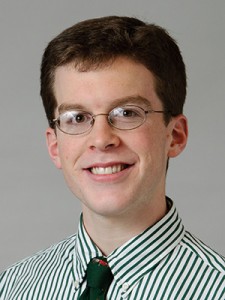
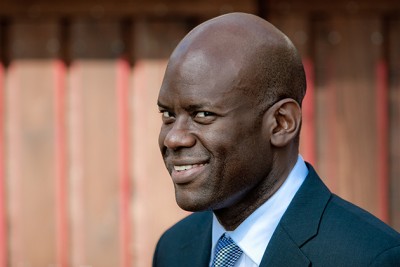
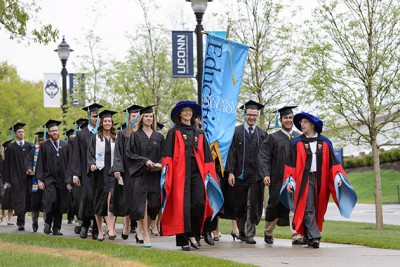
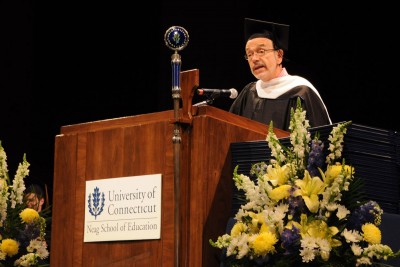 The undergraduate ceremony featured nationally acclaimed author and Neag alumnus Wally Lamb ’72 BA, ’77 MA, as commencement speaker. He also received an honorary Doctor of Humane Letters degree. President Susan Herbst introduced Lamb and led the conferring of his doctorate.
The undergraduate ceremony featured nationally acclaimed author and Neag alumnus Wally Lamb ’72 BA, ’77 MA, as commencement speaker. He also received an honorary Doctor of Humane Letters degree. President Susan Herbst introduced Lamb and led the conferring of his doctorate.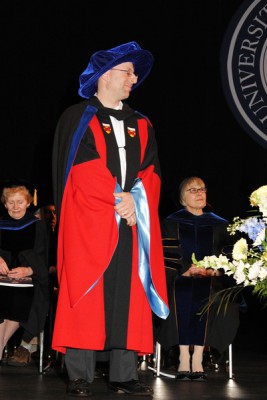 An associate professor of Education in the Department of Curriculum and Instruction, Marcus has gained high respect from both colleagues and students for his scholarship and teaching. He presents a role model for teaching excellence, creating a student-centered learning experience, collaborating with peers and colleagues here and abroad, and continuously seeking student feedback.
An associate professor of Education in the Department of Curriculum and Instruction, Marcus has gained high respect from both colleagues and students for his scholarship and teaching. He presents a role model for teaching excellence, creating a student-centered learning experience, collaborating with peers and colleagues here and abroad, and continuously seeking student feedback.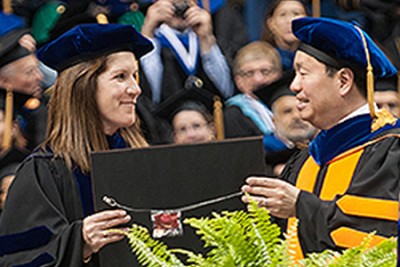 A lifelong athlete, Pescatello is also studying the influence of exercise on cancer survivors, and is in the early stages of new research on the use of yoga to help manage stress and reduce substance use among veterans who attend college and methadone users.
A lifelong athlete, Pescatello is also studying the influence of exercise on cancer survivors, and is in the early stages of new research on the use of yoga to help manage stress and reduce substance use among veterans who attend college and methadone users.

